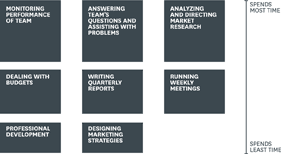Article Recommendations
"As many organizations continue to wrestle with how to structure work policies, now is the time to figure out how to grant employees control over their time in ways that can motivate them to do their best work, and experience greater satisfaction in both work and life. In our research we found that employees who have greater control over their time tend to be more satisfied with both their work and their lives. This suggests that work arrangements that grant employees more control and flexibility may not only improve employee well-being, but may also help employers retain the top talent they’ve been struggling to keep."
“...Great communication is a skill that nearly anyone can learn by taking the following steps: preparing before a conversation, asking deep questions during a conversation, and asking (and answering) follow-up questions throughout. In the context of work, mastering each step can help you...build lasting connections with people at all levels of your organization — connections that go a bit deeper than your typical professional relationship...Ultimately, they can help you grow in or beyond your role.”
"It’s common to wrestle with feelings of unmet expectations, missed opportunities, and paths not taken when you reach the midpoint of your career. But experts say that arriving at middle-age is also a profound opportunity for growth and self-reflection. It’s a chance to reevaluate your priorities, draw from your experience, and carve out a path that aligns with your goals for the second half of your professional life."
In her Harvard Business Review article, Why Career Transition Is So Hard, Herminia Ibarra posits that "you need to diverge and delay, exploit and explore, and bridge and bond to find a new narrative thread. In doing so it’s essential to engage with others and tell them your story—again and again, as much to make sense of your experience as to enlist their help...As constant reinvention becomes the norm, the stories that define us have no start or ending. Instead of closure, the prize is learning: What we learn about ourselves when we embrace, rather than resist, the loss of status and identity will give us access to more options in the long term. Proficiency in being liminal won’t reduce the great uncertainty before you. But it will increase your capacity to successfully navigate the present and future transitions that are the signature of a modern career."
"Servant leadership brought us to a more compassionate, human-centered work environment. It’s time for us to make the next leap. In today’s environment, burned-out leaders endlessly trying to serve will struggle to drive the innovation, resilience, and sense of meaning required for future growth. Elevating the lens to noble-purpose leadership has the power to unite employees and managers in the pursuit of making a difference."
"Giving developmental feedback that sparks growth is a critical challenge to master, because it can make the difference between an employee who contributes powerfully and positively to the organization and one who feels diminished by the organization and contributes far less. A single conversation can switch an employee on — or shut her down. A true developmental leader sees the raw material for brilliance in every employee and creates the conditions to let it shine, even when the challenge is tough."
"To treat mistakes restoratively, leaders need humility, grace, and patience. They must see any person’s arc of professional success as more than the sum total of any single assignment. Leaders also need the humility to acknowledge their contribution to people’s failures...We have a long way to go before accountability within organizations becomes a welcomed process that yields fair, actionable feedback and encourages employees to embrace the opportunity to improve their performance and expand their contributions. Making dignity, fairness, and restoration foundational components of accountability systems is a powerful place to start."
"How can white men be effective allies to those employees? First, by taking responsibility for their own behaviors, educating themselves about racism and privilege, and getting and accepting feedback from people in underrepresented groups. They can also become confidants to and sponsors of women and people of color and insist on diverse hiring pools and practices. They can vigilantly watch out for bias at work, intervening decisively if they discover it. Last, they can work to build a community of other allies against racism and sexism."
This piece posits that curiosity and provocative, aperture-widening questions are exceedingly helpful (if not always comfortable) to being present to and successfully navigating inflection points. When done with intent and a desire to grow, a commitment to ask before assuming or asserting fuels trust, deference to expertise and humility. Questions can ignite generative environments that inspire depth of inquiry, breadth of imagination and leaps in innovation.
"Our research reveals that strategic questions can be grouped into five domains: investigative, speculative, productive, interpretive, and subjective. Each unlocks a different aspect of the decision-making process. Together they can help you tackle key issues that are all too easy to miss."
"By reframing how we think and communicate these types of skills, we can broaden our perspective of who might have them and how we can train for them, thereby creating leaders who are flexible, resilient, and enduring — anything but soft."
"Recognizing employees for the good work they do is a critical leadership skill – and has an impact on morale, productivity, performance, retention, and even customer satisfaction... Managers who are rated in the top 10% for giving recognition are much more likely to have employees who report feeling engaged, confident they’ll be treated fairly, and willing to put in higher levels of discretionary effort."
"...We become who we are with help and support from those around us, and we all yearn for authenticity in our significant relationships. The same needs and desires underlie developmental relationships in the workplace...If we want to realize the full benefits of developmental relationships—and ensure that members of underrepresented groups share equally in them—we need to create the organizational conditions that will allow a new model of authentic sponsorship to emerge."
The authors urge "....organizations [to] promote principles and practices that: promote gender equity, develop compassionate leadership, and increase learning through intentional peer coaching and advisory circles for men and women."
"The requirements for talent management in the modern economy may feel daunting...Top talent enables outcomes that otherwise wouldn’t be possible—special, tail-of-the-distribution-curve outcomes. If you rely on these people for outstanding organizational performance, you must treat them as valued, unique individuals. Never dismiss their ideas, never allow their progress to be blocked, and never miss the chance to shower them with praise when they succeed."
"Employees want to be seen, valued, and listened to. They want equity, dignity, security, balance, flexibility, and autonomy. They expect opportunities for growth, learning, meaningful contribution, and fulfillment...The question is no longer 'What do you do?' but rather 'Who do you wish to be and become?' Talent attraction, career development, and professional identity are all in flux."
"Finding an employer and role that are value-aligned can reveal opportunities that you might not have thought about or even noticed before. You might consider taking a job with a different title than you’ve had before because of the contributions you would be making and the expertise you would gain, as well as the quality of teammates and opportunities for advancement toward where you truly want to be in life. This is how you seize opportunities that otherwise would have passed you by unnoticed."
The authors note that "the key to navigating the unknown is to rethink our relationship with change and to recognize that what now? moments can be an invitation to inquiry and exploration rather than a threat. This means acknowledging that new circumstances may lead us to freeze or react without thinking, and that our first impulse is something we can temper with attention and practice...[We can] view points of inflection as opportunities to reflect on our commitments, examine our priorities, and course correct when necessary. Learning to do so is a professional and personal development imperative in times of uncertainty and change."
John Hagel III, explores what he terms "the right kind of learning;" those who create new knowledge rather than just passing on existing knowledge and skills. "Cultivating the passion of the explorer enables innovative thinking in the organization at a whole new level. The institutions that restore our humanity in this way will unleash a much more powerful form of learning among all workers that will lead to exponentially expanding opportunities. But harnessing that opportunity requires us to move beyond fear and to find and cultivate the passion of the explorer that lies waiting to be discovered in all of us."
"We asked Caver and Livers, faculty and coaches at the Center for Creative Leadership, to write a fictional letter from a black manager to a white boss describing the miasma and what it’s like to be different in the workplace...Their letter portrays the nature of corporate life once black managers are established—the feeling that they leave some part of their identity at home and the sometimes subtle and often systemic racial biases that inhibit and alienate African-Americans."
The Atlantic: ‘What If the Thing You’re Waiting for Never Arrives?’ "Waiting for Godot is a classic that feels like it was written for the Delta era of the pandemic."
Occam's Razor: This I Believe: A Manifesto for a Magnificent Career. "I've developed an overall macro-philosophy that guides my career choices. I've also collected a cluster of personal philosophies and core values that guide my day-to-day work. My hope is that you'll find my lessons to be of value as you think about your own professional career, both from a macro context, in terms of what you are solving for, and in a micro context, in your day-to-day work."
Harvard Business Review: How to Reframe What Work Means to You. "Applying this very human sense of purpose to work changes how we approach it and therefore how much we engage in it...A personal sense of purpose is not in and of itself the only thing that fires people up at work. But being able to connect what we do every day with a bigger sense of why we do it helps infuse us humans with energy, drive, and direction."
Harvard Business Review: "Why Are We Here? Purpose is the key to motivation—and motivated employees are the key to realizing your purpose. Get this symbiotic relationship right, and your organization will thrive."
The Atlantic: The Atlantic: Your Professional Decline Is Coming (Much) Sooner Than You Think: Here’s how to make the most of it. "The secret to bearing my [professional] decline—to enjoying it—is to become more conscious of the roots linking me to others. If I have properly developed the bonds of love among my family and friends, my own withering will be more than offset by blooming in others."
Harvard Business Review: Managing Yourself: Turn the Job You Have into the Job You Want. "Job crafting is a simple visual framework that can help you make meaningful and lasting changes in your job—in good economies and bad. But it all has to start with taking a step back from the daily grind and realizing that you actually have the ability to reconfigure the elements of your work."
Harvard Business Review: The Making of a Corporate Athlete
If there is one quality that executives seek for themselves and their employees, it is sustained high performance in the face of ever-increasing pressure and rapid change. But the source of such performance is as elusive as the fountain of youth. Management theorists have long sought to identify precisely what makes some people flourish under pressure and others fold. We maintain that they have come up with only partial answers: rich material rewards, the right culture, management by objectives.
Harvard Business Review: Managing Yourself: Turn the Job You Have into the Job You Want. "Job crafting is a simple visual framework that can help you make meaningful and lasting changes in your job—in good economies and bad. But it all has to start with taking a step back from the daily grind and realizing that you actually have the ability to reconfigure the elements of your work."
"Developmental feedback (provided either informally or via official management processes) is a significant yet often-overlooked driver of professional growth...Our research demonstrates how differences in developmental feedback can direct women along different — and less effective — leadership pathways than men, creating long-lasting gender inequities."





























In a recent Harvard Business Review article, Why Employees Quit, the authors look at the motivators and behaviors that both "push" people to leave their employers, as well as those that "pull" them to stay. Many people are pushed due to a lack of respect, trust, engagement, sense of purpose, porous boundaries and unclear paths for growth, development and advancement, to name a few. They are pulled, essentially, by the exact opposites forces that push them, with many attractive pull features coalescing around autonomy, mastery and purpose.